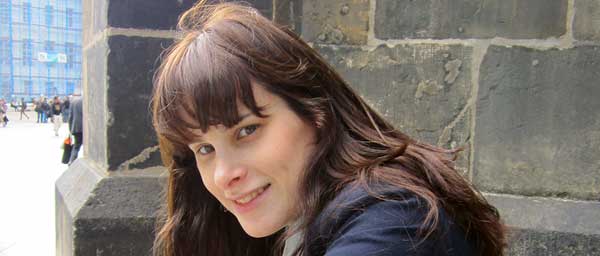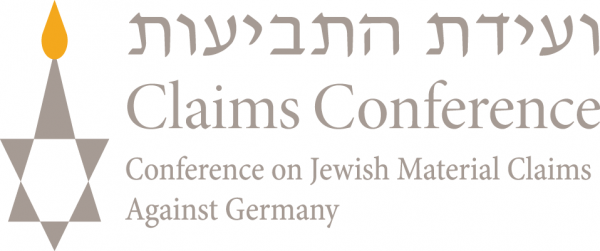Volunteer Visitor Bonds With Survivor

Revital Hadar-Rosen of Ramat Gan, a recent graduate of Tel Aviv University, volunteers with Zachor v’Kabed and the Foundation for the Benefit of Holocaust Victims in Israel.
In Israel, Hillel, the Jewish university student organization, has found a way to make the vital connection between young people and survivors so the stories of the Shoah may continue to be told for generations to come. Through Zachor v’Kabed, Remember and Honor, which is supported by Claims Conference allocations, university students throughout Israel each year are forming emotional and long-lasting bonds with the country’s Shoah survivors.
Many Shoah survivors in Israel live in loneliness and suffer from financial and social hardships. Through the yearlong Zachor v’Kabed program, student volunteers are connected with an individual Shoah survivor, visiting on a regular basis and bringing companionship to a cherished survivor who is otherwise alone. In many cases, these student volunteers are also able to assist survivors in applying for benefits and assistance.
Revital Hadar-Rosen of Ramat Gan, a recent graduate of Tel Aviv University, is one such participant. Her volunteer work with Zachor v’Kabed over the past 18 months has brought her accolades, and last month she was recognized for her efforts by the Foundation for the Benefit of Holocaust Victims in Israel.
Now in its sixth year, Zachor v’Kabed combines two hours per week of volunteer work with learning sessions and public events designed to bring awareness of survivors’ issues. This academic year, about 120 students at the Hebrew University of Jerusalem, Tel Aviv University, University of Haifa, Ben Gurion University and Sapir College are paired with Shoah survivors in their communities, and thousands more volunteer through community public-awareness events.
Revital, 32, has a bachelor’s degree in social sciences and humanities from Tel Aviv University. Both of her grandmothers are Holocaust survivors. One escaped from the Częstochowa ghetto in Poland, became a partisan and was hidden by a Polish family, but unfortunately never shared her life story with Revital before passing away. The other grandmother is a survivor of a Romanian ghetto. Both made aliyah to Israel in the 1940s.
Revital admits that throughout her childhood she avoided anything to do with the Shoah, refusing to participate in a school trip to Poland and avoiding Shoah films on television. But participating in Zachor v’Kabed, she says, “allows me to cope with the Shoah in a way that is most suitable for me, after the long years that I’d been totally avoiding it.”
For well over 1 ½ years, Revital has visited Shoah survivor “A,” coming to her apartment twice a month for conversation and cookies. A., 92 years old, was born in 1922 in Lipcani, which then belonged to Romania and today is part of Moldova. She survived the Shoah because she was searching for her husband, who had been drafted into the Soviet Army in 1941. After many months she was reunited with her husband, and then started looking for her family. That search revealed that her and her husband’s families had been murdered in the Chernovitz ghetto. A. made aliyah in 1950.
Revital and A. talk about current political events and Revital helps A. write her life story. Revital teaches A. card games and A. teaches Revital to knit. The link between the two women has grown so strong that the visits have continued even after
Revital graduated from university and left the Zachor v’Kabed program. She has introduced A. to her husband and to her grandmother. “First I was afraid that I wouldn’t have so much to give her from myself,” Revital says about her initial visits with A. “I quickly realized that I was wrong. I got to know her, and slowly found out that I give her much more than what I first thought.
“The thing that motivates me to take part in Zachor v’Kabed is the will to help Shoah survivors any way I can,” Revital says. “What’s interesting and rewarding for me is to see, hear and deal differently with the Shoah issue. What I like is the chance to talk with A. about varied issues, her curiosity, her wisdom and the way she gives me attention and caring.” Revital also spreads awareness of survivors’ issues through social media.
“I think it’s an honor and a huge right to take part in this program and support Shoah survivors as much as I can. We all owe them the existence of our country and must give them the respect they deserve so much. It’s also important to remember and never forget their history, and to pass it to future generations,” Revital says.

